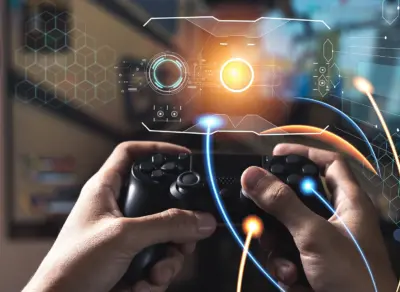
Why is Data Privacy in the Gaming Industry Important?
Introduction
Gone are the days when you need a take a cassette out of a console, clean it sometimes, then replace it in the console and wait for anything to appear on the television screen. If you don’t understand what I mean, you are from a generation that has a wealth of alternatives at their fingertips on a smartphone. I’ve had the rare chance to see the progress of technology and its influence on gaming and gamers in India. With the wide availability of smartphones and tablets now and with the deep penetration of the internet, it has made it possible for players to enjoy their favourite game, As the gaming industry continues to evolve and expand, it is important to note that with the growth of the online gaming industry data privacy has become an important issue. In this blog post, we will cover why data privacy is important for the industry and players.
Why do gaming companies require personal information?
Gaming firms or companies target the gamers demographic via various touchpoints. This drives individuals to look up their name, postal address, date of birth, email address, and payment information to build online accounts.
The information in those accounts is frequently utilised to link to larger online social networking sites, aid in-game advertising, analyse gaming preferences, and ease in-game interactions by even offering matchmaking services.
The data also aids in the storage of payment information for in-game purchases and funding multiplayer activities. further, it has been seen that gaming businesses collect a lot of data from users in order to improve everyone’s gaming experience. In the case of Activision, the business emphasises in its privacy policy that players can expect monitoring when it comes to their in-game conversations or voice interactions since the information of the players is monitored for anti-cheat, anti-fraud, and anti-toxicity purposes.
How do cybercrimes use this information?
An online security research site recently issued a report(Opens in a new window) examining prominent gaming companies’ privacy practices. TechRobot discovered that more than half of the online game producers studied in the study keep data on who players play with, and over 90% of the game businesses gather data from in-game interactions.
Riot Games, the firm behind the immensely successful free-to-play title League of Legends, is the most egregious data collector in TechRobot’s research. Riot Games announced its most recent data breach in 2013, when around 120,000 transaction records were accessed. Riot Games has been revealed to automatically collect information such as a player’s IP address, geographic location, ISP, and chat logs. Riot also gathers any information that users willingly supply, such as demographic information, interests, favourite games, and contact lists.
Riot obtains a lot of personal information, which is precisely what fraudulent actors want when they’re crafting their identity theft operations. In the aftermath of a data breach, hackers may easily merge all of those separate bits of personally identifying information to develop a victim profile. The fraudsters then use these data profiles to impersonate their victims and obtain lines of credit in their names or to construct phoney social media identities to swindle the individuals on their contact lists.
Threats to Gamers’ Data
Online gaming forums are filled with complaints of lost — and most likely stolen — game merchandise, accounts, or hostages abducted for ransom, as well as credit card bills displaying illegal in-game purchases. For a gamer who has spent hundreds of real-world dollars and hours in-game to achieve something significant, losing a virtual asset means everything. Furthermore, hackers may easily trade a stolen virtual product for cash. Again, it may be used to get access to the victim’s email and other internet accounts and then sell them on dark web markets.
Gamers frequently fall victim to cheap offers while downloading cheaper versions of the same game, consequently installing viruses and malware.
Opening phishing emails, being duped by cyber bullies, allowing cross-site scripting (XSS) through insecure login techniques, and even utilising similar usernames and passwords across all gaming platforms makes their credentials exposed to hackers.
How to Avoid the Dangers of Online Gaming?
Cyber hygiene is essential for maximum protection here are a few suggestions to keep yourself safe while playing online:
- Use stronger passwords
- Set up multi-factor authentication
- Avoid disclosing personal information needlessly
- Avoid downloading from unauthorised sources
- Keep an eye out for hidden fees and potential frauds.
- Update your software regularly
- Ensure that your data is destroyed before disposing of the device
As the gaming business evolves and develops new methods to connect, privacy and security must be considered in the basic design of gaming goods and services. It cannot be an afterthought.
Tech-savvy gamers, particularly those participating in eSports, understand the risks of sharing their personal information. As a result, online gaming companies must upgrade their security measures to ensure that gaming is safe.
Why is data privacy a Priority for gaming industries?
Data privacy is a concern for the gaming industry in order to secure personal information, preserve trust and reputation, comply with legislation, minimise fraud and cybersecurity risks, improve player experience and engagement, and perform ethical commitments. By prioritising data privacy, the gaming industry promotes a safe and secure environment for players, establishing a pleasant and trustworthy connection between players and gaming firms.
Data privacy also helps to a great gaming experience. When players are confident that their personal information is secure, they are more inclined to engage in online interactions, multiplayer experiences, and in-game purchases. By prioritizing data privacy, the gaming industry guarantees that users can fully enjoy their gaming experiences without fear of their personal information being compromised.
A critical part of data privacy is obtaining user permission. Before collecting or processing personal data from customers, gaming firms now get their express consent. Consent is often obtained through simple opt-in processes that provide individuals choice over what information is released. Furthermore, players are given simple opt-out choices that allow them to change their data preferences and remove consent at any time.
The gambling industry conducts regular security audits and compliance inspections to maintain strong data privacy practices. Independent security experts are regularly employed to examine the effectiveness of privacy safeguards and identify weaknesses. To ensure compliance and accountability in handling players’ personal information, game companies must also adhere to applicable data privacy rules, such as the General Data Privacy Regulation (GDPR) in the European Union.
Gaming companies understand the responsibility they have to protect players’ personal information with care and respect. Maintaining and respecting Players’ privacy and safety should be the top priority for the gaming industry.
Conclusion
As the gaming business develops, data security becomes increasingly important. Game developers and publishers recognise the importance of safeguarding players’ personal information and have included a variety of safeguards to prioritise data security. The gaming industry guarantees that players may enjoy their digital worlds while preserving control over their data through increased openness, secure data storage, data reduction, authorisation systems, frequent security assessments, and user empowerment. By continuing to emphasise data security and establishing trust and confidence among gamers worldwide, the gaming industry offers a good example for other industries.
References
https://www.analyticsinsight.net/online-gaming-and-data-privacy/
Tanu Shree Saxena, Cyber Trainer, Policy and Advocacy team





FEEL FREE TO DROP US A LINE.